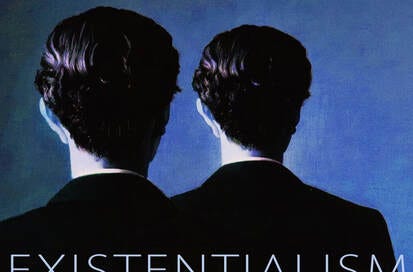…philosophy, like art or poetry, rests on a foundation of personal involvement…it has its source in a vocation, where the word “vocation” is taken with all its etymological significance. I think that philosophy…has to be considered as a personal response to a call – Gabriel Marcel
The foremost inarguable verification of Selfhood in Heidegger is found in the unlikeliest of places – the theory of “nothingness.” To come upon the Self is to understand the role of nothingness in one’s life. It is to realize that Dasein’s temporal and spatial existence is set upon and determined by it. However, as Heidegger wished to show, it’s not easy comprehending nothingness when our entire psyche recoils from anything to do with it, when consciousness itself has abandoned it, causing it to be even more obscure than it actually is. As Heidegger pointed out, the obscurity of Being and Nothingness is partly due to human dissociation. What passes for modern consciousness is a matter of evasion, self-deception and concealment. What is it, he asked, about Being and Nothingness that we dread? Are we not rational animals? Are we not at the head of the food-chain? Are we not possessors of the world and commanders of reality?
The structure of our everyday lives is informed by a double concealment: oblivion of the darkness of existence and escape from one’s self - Tetsuaki Kotoh
What most champions of Selfhood fail to grasp is that Existentialism’s concern about “nothingness” is comprehensible only in terms of the existence of an Imperial Self that stands upon the void with everything to lose in terms of identity should being collapse into it.
A self is not a thing which may or may not exist; it is an original phenomenon which logically precedes all questions of existence – Paul Tillich
Although in the nineteen fifties Heidegger backed away from the term Existentialism, his work is the necessary apotheosis of said philosophy. This is particularly the case in terms of nothingness and non-being.
In previous chapters we’ve seen that Existentialism is primarily concerned with identity, individuality and Selfhood. It is preoccupied with how beings experience the world they find themselves thrown into without explanation. Later we’ll explore were Dasein is thrown from. For now, we simply acknowledge that Heidegger’s approach to the mystery of Being is through the unique being who, as a being, makes Being important. It’s an extension of care that opens us to the Question of Being, care being our true foundation, not reason or the Will-to-Power.
This care also opens us to the inevitable despair and alienation that accompanies Self-observation. The mere intrusion of the “nothing” shakes the ego to its foundations and upsets the cart. We cannot continue in forgetfulness, serving the senses and laughing in the face of meaning when haunted by thoughts of nothingness. The return from the horizon of death introduces us to this nothingness underlying being. From this point on Being and Nothingness cannot be distinguished. One implies the other. The anxiety that shakes and destabilizes us remains a factor, not only because of death’s inevitability, but because of nothingness. After all, says Heidegger, we don’t experience our own deaths. It’s a possibility that ends all our possibilities but isn’t actually something we live through to understand and explain. Such is not the case with nothingness. It’s something we do experience and must experience as beings.
Existentialism is essentially a philosophy of nothingness, examining the symptoms of distress, despair and dread paralyzing humans who must consciously face it. What shape does a world take when it’s erected as a bulwark against the fear of non-being? That kind of question and inquiry isn’t ever going out-of-date, regardless of what corrupt institutions of learning say and do and what drug monopolies create in their sterile labs.
A few scholars begrudgingly accept that Heidegger’s philosophy is about individualism, but most “forget” to mention it explicitly. Inauthentic types don’t really want other people to be authentic, and most teachers and professors of philosophy are not interested in authenticity, even if they “know” a lot about it. (You should hear what Heidegger said about his academic colleagues.)
In any case, despite academic antics and duplicity, it needs reaffirming that Heidegger’s philosophy is, in its own idiosyncratic way, undoubtedly in favor of individualism. It’s about “Knowing Thyself” as a Self (or in most cases as a non-Self).
Dasein is defined as the entity whose mode of Being is precisely to raise its Being as an issue for itself - T. B. Yagi
Heidegger’s philosophy is deeply personalistic, given that unlike the grey anonymous Das Man, Dasein is concerned with his existence and fundamentally caring toward himself and the world. He cares about Being, and as a being finds himself sincerely asking the Question of Being.
Dasein is that kind of being which I myself always am. It has the character, for me, of a Self – Martin Heidegger
…Dasein is an entity that understands its own being. Dasein exists; and this means it makes choices. It is distinguished from all other entities by comporting itself toward its own existence – Richard Sembera
To be authentic is to testify to one’s being as one’s own – that my being-in-the-world is my own task to bear and something for which I alone am responsible – Sara Mills
...since each Dasein must encounter itself through itself, such an encounter must be a personal one. in place of all the abstract ideas which the philosophers of the tradition occupied themselves with, Kierkegaard and Heidegger have rectified the focus in these ways that we now have a clearer understanding of who we are and our way of Being-in-the-world – T. B. Yagi





